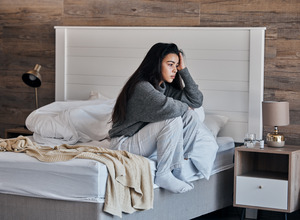
Some of the symptoms connected to sleep apnea are more obvious than others. You’re probably aware of how the disorder can leave you feeling excessively tired during the day – but did you know it could affect your mental state as well? Research has found that sleep apnea and depression can be linked to each other. Below, you can learn more about this relationship as well as what you can do to improve the quality of your slumber.
How Can Sleep Apnea and Depression Be Connected?
A study published by the Journal of Clinical Sleep Medicine found that about 73 percent of people with sleep apnea also have significant symptoms of depression. The two conditions share a number of similar warning signs, such as causing tiredness and making it difficult to concentrate; because of the overlap, people with sleep apnea may not always realize that they’re also experiencing depression, and vice versa.
The same study also found that having sleep apnea treated could go a long way toward reducing symptoms of depression. This highlights the importance of addressing sleep apnea in order to protect your mental well-being as well as the overall health of your body.
What Can You Do About Sleep Apnea and Depression?
Sleep apnea is often managed with a CPAP machine, but this form of treatment isn’t for everyone. Those who are CPAP intolerant may instead want to consider oral appliance therapy. This involves wearing an oral appliance that helps keep the airway open while you slumber, thus making it less likely that your breathing will be interrupted due to an obstruction. A sleep dentist can help you determine whether oral appliance therapy is a viable option in your case.
By getting your sleep apnea under control, you will be able to enjoy better quality sleep, which in turn can reduce depression. Of course, depressive symptoms might persist even after your sleep apnea has been successfully treated, so it’s a good idea to speak to a mental health professional who can help you determine the appropriate steps to take.
There are certain measures you can take to address sleep apnea and depression at the same time. For example, obesity is a common risk factor for both conditions, so it may be beneficial to take steps that can help you lose weight, such as exercising more. You should also stay away from alcohol, as it is known to potentially make depression and sleep apnea more severe.
Regardless of whether you have sleep apnea, depression, or both, acting quickly to get the treatment that you need is essential if you want to improve your health and your overall quality of life.
About the Author
Dr. Jennifer Sherwood Bragg is a Diplomate of the American Board of Dental Sleep Medicine and holds membership with the American Sleep and Breathing Academy. She has been able to help hundreds of patients enjoy more restful nights by treating their sleep apnea. To schedule a consultation with Dr. Bragg at Sleep Forsyth Dental Sleep Medicine in Cumming, visit her website or call (470) 281-9905.

